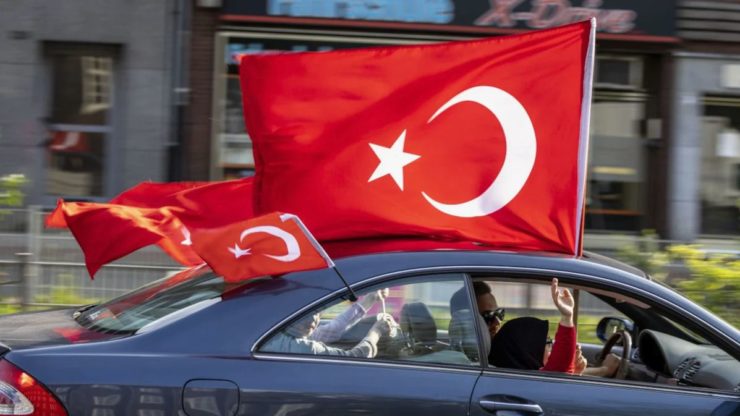
Ahead of Turkey’s local elections, incumbent President Recep Tayyip Erdoğan and his Justice and Development Party (AKP) team are stepping up their efforts against their opponents in the upcoming campaign. The Central Election Commission of the Republic of Turkey has set the election date for the last Sunday in March 2024, which falls on 31 March. The CEC document states that “the decision was made unanimously” after a meeting of the commission’s presidium, the government publication Rasmi gazete reported.
Experts say the upcoming local elections are a challenge for both the ruling AKP and the opposition bloc. Despite the defection of Erdoğan’s main rival, opposition candidate Kemal Kılıçdaroğlu, his Republican People’s Party colleagues Mansur Yavaş and Ekrem İmamoğlu, the mayors of Ankara and Istanbul respectively, should not be written off. The major cities of Izmir, Adana and Antalya are also run by AKP rivals.
The state of affairs in Turkey’s megacities is a kind of marker, reflecting the mood of society. For example, the presence of liberals in power in major cities is a sign of the Turkish population’s desire for secularism. The results of the presidential elections in May-June this year made it clear that the increasing Islamisation of the AKP’s traditionalist agenda is frightening the liberal part of society. If Erdoğan wants to win back the loyalty of the megacities and maximise the number of municipalities, he needs to work more carefully with the secular electorate.
Given that both traditionalists and liberals in the republic are ardent patriots of their country, the latter still tend to turn to the West when their demands are not met by the Turkish leadership. This is a direct threat to the unity of the nation, and Erdoğan is well aware of this.
Taking into account the changes in Turkey’s domestic political landscape due to the presidential elections in May-June 2024, the AKP has a high chance of retaining power if the opposition is unable or unwilling to block and form tactical alliances. We can therefore conclude that Turkey’s foreign policy course is unlikely to change significantly in the medium term. At the same time, a repeat of the Istanbul scenario cannot be ruled out, when a dark horse in the person of E. İmamoğlu was able to win the loyalty of both secular and religious voters during the election campaign, thus declaring himself a contender for the role of Turkey’s future leader. Erdoğan himself later said in interviews with journalists, “How could we lose Istanbul?
The growing competition and the last victory of the incumbent president of Turkey, which he won by a minimal margin, has Erdoğan preparing his sledges for the summer. In the new term, the Turkish leader’s main challenge will be to deal with the financial crisis. A crisis of his own making.
While the Turkish Central Bank’s statistics show that inflation in the country is at 66.7%, independent agencies say that its real volume is 107.6%. The main cause of dissatisfaction among the Turkish population remains the huge increase in prices. Despite changes in the country’s monetary policy and the application of a modern approach with the involvement of new personnel, the Central Bank has so far only managed to cool inflation expectations slightly.
Erdoğan’s successes on the economic front include attracting foreign currency revenues through high-interest rates favourable to foreign investors, implementing mega-projects such as the construction of the Akkuyu nuclear power plant and re-exporting European goods to third countries, including sanctions-hit Russia. Even here, however, all is not so smooth: in January 2024, the US imposed secondary sanctions on banks that interact with the Russian Federation in circumvention of the previous bans.
Under these circumstances, Erdoğan is trying to strengthen his authority through his foreign policy agenda. First of all, this is megaphone diplomacy in the context of the aggravation of the Arab-Israeli conflict. Having assumed the role of protector of the entire Muslim civilisation, the Turkish president does not hesitate to play on the contradictions of Western states. Thus, in exchange for Sweden’s accession to NATO, the politician exchanged F-16 fighter jets with the Americans. As if that were not enough, he continued to lobby for the purchase of Eurofighters by the Europeans. The manufacturers of the planes, Italy, Spain and the UK, have already given in and are ready to supply Turkey with the planes. So far, only Germany has opposed Erdoğan. Such actions have angered Greece and Cyprus, which fear a threat to their security from Turkey. Athens and Nicosia are trying to block Ankara’s efforts by sending numerous parliamentary questions to the European Commission.
Who knows, perhaps the ability to manoeuvre between Russia and the West, as well as the expansion of Turkey’s military capabilities to defend the Muslim world, will secure another term for Erdoğan.
Bakhtiar URUSOV, political observer, especially for online magazine “New Eastern Outlook”
